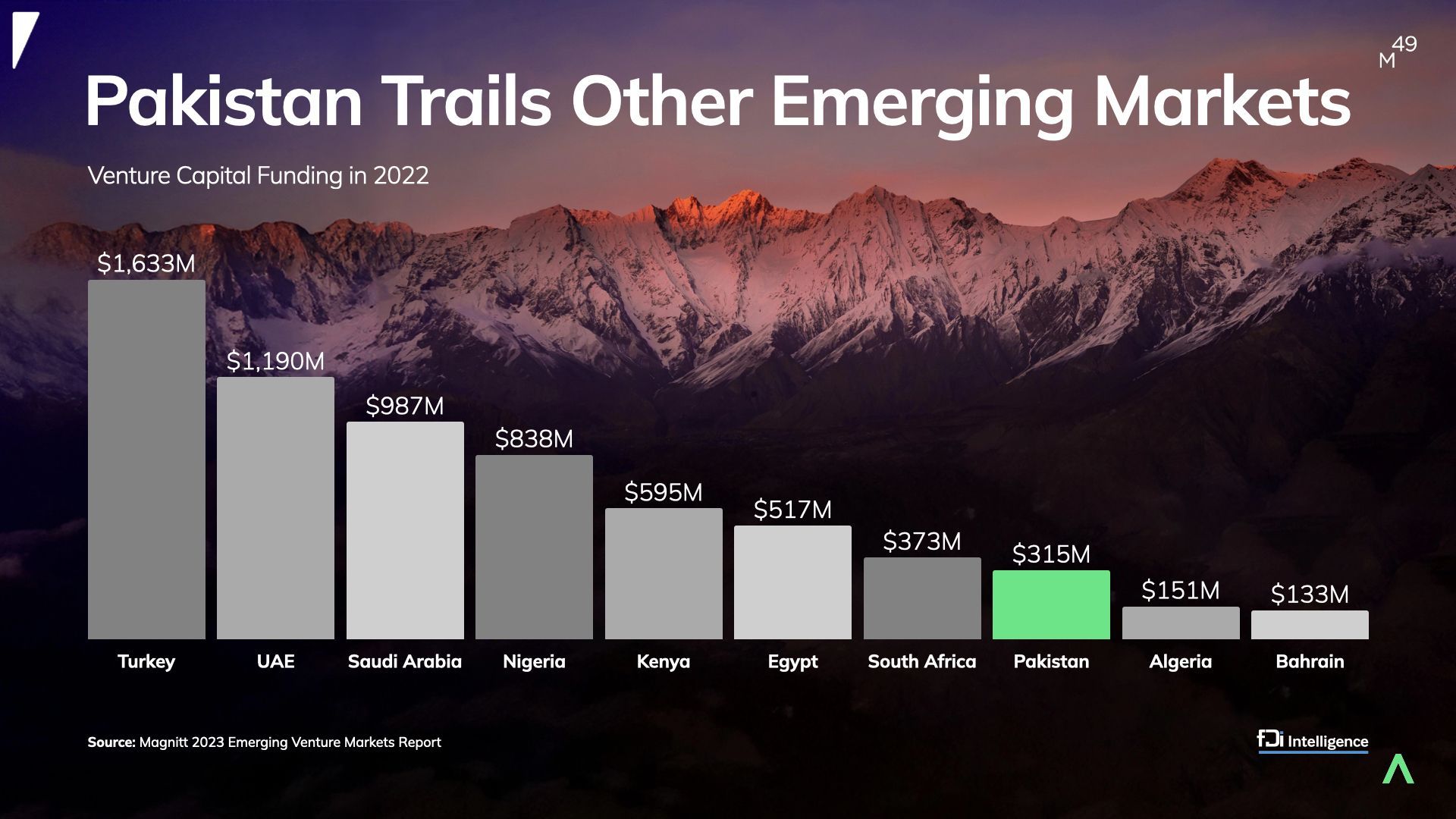With a growing population, a youthful workforce, and a surge in technology professionals, Pakistan can be fertile ground for corporate ventures and corporate venture capital.
By Kaamil Hussain, Venture Associate at Mach49
Handicapped by a lack of capital, misalignment of financial incentives, and regulatory constraints, however, Pakistan has seen missed opportunities. As market dynamics shift and the foundations for a thriving venture ecosystem form, large Pakistani companies can embrace venture-driven growth, shaping this ecosystem and reaping the benefits of Pakistani entrepreneurship – or risk falling behind in a world racing towards progress.
Pakistan is known for its unbelievably chaotic cricket team, which forms one half of the greatest sporting rivalry on the planet. Not to mention colorful textiles and embroidery, and dishes like Burn’s Road Nihari, Student Biryani and Seekh Kebabs.
What Pakistan is not known for? A vibrant startup and venture ecosystem.
In my conversations with Pakistani entrepreneurs, investors, and executives, I heard a lot of skepticism about the future of venture-driven growth in Pakistan. That's despite Pakistan having, in my opinion, the foundational elements for a thriving entrepreneurial ecosystem. For starters, the nation has the fifth largest population in the world. And that population is both overwhelmingly young (with a median age of 22) and bilingual - Pakistan has the fourth largest number of English speakers in the world. Add to that one of the fastest-growing middle classes, more than 100 million mobile broadband subscribers, and a growing cohort of technology professionals, and you have the seedlings of a fertile market for new ventures.
And yet, Pakistan lacks the startup success stories of its Middle Eastern, North African, and South Asian peers, such as India, the UAE, and Saudi Arabia. It ranks 76th among the 100 economies featured in
StartupBlink’s 2023 Global Startup Ecosystem Index, and until recently, venture capital funding deployed in Pakistan was a trickle compared to similar developing economies in the Middle East, North Africa and other parts of Asia.

Despite the skepticism displayed by my contacts in Pakistan’s business community, I believe that the country holds tremendous promise for entrepreneurship and venture-driven growth. Many of the historical barriers that have hampered advancement are slowly but surely falling to the wayside. The technology talent pool and infrastructure is maturing, and Pakistan’s corporate giants are in dire need of new avenues for growth.
Historical Challenges for a Pakistani Venture Ecosystem
The advancement of startup activity and venture capital in Pakistan has historically been limited by:
- Political and economic instability
- An unsupportive regulatory environment
- Shortages of high quality talent (exacerbated by brain drain);
- Large Pakistani corporates not participating.
The latter is perhaps the most concerning.
Instability at the highest levels of government has resulted in inconsistent policies. Coupled with dramatic currency fluctuations, this has hurt investor and business confidence, thereby discouraging venture growth. Local taxation frameworks unfavorable to investors have further exacerbated the issue and limited the capital available to Pakistan’s startups. Weak enforcement of intellectual property rights have made it difficult for the country's upstarts to safeguard their ideas and inventions effectively.
Pakistan has also struggled to develop and retain top-tier technical talent. Pakistanis who have had the means to do so, have historically left the country. They find work in the West or in growing MENA economies like Saudi Arabia and the UAE. Many Pakistanis studying abroad at US and UK universities have also chosen to
remain
abroad. The Pakistani diaspora is now one of the largest immigrant populations in the world, the majority based in the Arabian Gulf. This has led to a brain-drain for Pakistan, while also creating a potential expat market for Pakistan’s startups.
Finally, the very large family-run conglomerates that have long dominated the Pakistani economy with captive business models, have focused more on incremental growth and short term income than on pursuing exponential growth and transformation. These local market behemoths have not been forced to consider or invest in transformative endeavors, so far.
But market dynamics are changing.
The industries that have traditionally sustained the Pakistani economy, face impending declines. Much like Brazil in the early 2010s, Pakistan is at an inflection point.
Pakistani corporates need to embrace entrepreneurship and venture-driven growth or they will miss coming opportunities and fall behind.
Lessons to Learn from Brazil’s Venture Ecosystem
In many ways, Pakistan’s venture ecosystem can be compared to that of Brazil’s a decade ago. The early 2010s saw the founding of Brazilian tech startups like Gympass, Loggi, QuintoAndar, and the minting of Brazil’s first tech unicorns. 99, a ride-sharing unicorn, was acquired by Didi Chuxing in 2018, while Nubank, a fintech unicorn, went public in 2021.
At the time of their inception, Brazil’s startups and investors were dealing with unfavorable taxation policies, shortages in technical talent, and regulatory barriers. VC funding in Brazil amounted to almost $310M. In the years that followed, this number rose dramatically as the Brazilian government introduced new policies and programs to promote entrepreneurship. The push by government organizations to support new ventures in Brazil was accompanied by an expanding middle class, greater consumer spending, and increasing internet and mobile penetration. The parallels with Pakistan are obvious.
Brazil also experienced shifts in cultural attitudes toward entrepreneurship and risk-taking, as Brazilians saw the success of American upstarts and homegrown unicorns. Brazil attracted both local and foreign Venture Capitalists looking to fund ventures, such as Monashees, Kaszek Ventures, Redpoint eventures, and Valor Capital Group.
VC funding more than doubled,
from almost $310M in 2012 to $746M in 2015. And by 2021, VC investment in Brazil reached almost $9B.
While the regulatory and tax environment in Brazil is by no means optimal, and the country still faces limitations around technical talent and infrastructure, there have been undeniable improvements on all fronts in the past decade. Brazil’s venture investors, family offices, large corporations and entrepreneurs have taken advantage of these changes. Brazil has developed a thriving venture ecosystem that has produced 25 unicorns. In addition, São Paulo has cemented its status as the startup hub of LATAM.
Pakistan is the Base Camp of a Similar Journey
While there are obvious differences between Brazilian and Pakistani markets, there are also many parallels. Those parallels suggest Karachi and Lahore could rival Riyadh and Dubai to become a startup hub in the region. Regulatory bodies are in the early days of implementing policies and programs designed to foster a conducive environment for new ventures, mirroring the regulatory reform seen in Brazil.
Notably, in February 2021, Pakistani companies were permitted to establish holding entities abroad while retaining their operating company in Pakistan. This is key to attracting foreign investors. The State Bank of Pakistan also changed policies regarding the repatriation of investment, removing the requirement of obtaining prior approval before repatriating. Moreover, the State Bank regularized the issuance of convertible debt, making it easier for startups to raise funds through debt financing that can be converted into equity. And they have created a framework to streamline cross-border digital banking.
Elsewhere, the Ministry of Information Technology and Telecommunications announced its intention to invest in local startups through the government-funded Pakistan Startup Fund. While much more regulatory change is needed for Pakistan’s technology and entrepreneurship ecosystem to thrive, this is a good start. It's a signal that historical regulatory barriers are slowly falling. These changes provide Pakistan’s venture investors, corporations, family offices, and entrepreneurs with the opportunity to replicate something akin to what Brazil’s venture ecosystem has created.
Today, Pakistan is in a similar position to Brazil circa 2012, and regulatory changes in the country have already created progress when it comes to new venture creation and investment. Venture investment in Pakistan grew almost tenfold from $36M in 2019 to $350M in 2021.
A key catalyst for the growth in domestic startup activity was the success of Careem – a ride-hailing platform acquired by Uber for $3B in January 2020. The company’s rapid success created what is known as the “Careem Mafia” (resembling the PayPal Mafia). This group of former employees and founders have gone on to found and invest in other Pakistani startups. The successful exit of Careem, the rise of upstarts like Daraz, Zameen, and Dawaai, and the balloon in VC dollars invested in the country, has already inspired aspiring entrepreneurs and motivated technical graduates, educated abroad, to return home. They're sensing new opportunities.
Venture in Pakistan is Nascent but Maturing
Pakistan’s startup and venture landscape is very much in its infancy. Only in the last decade have networks of formal early-stage investors started to form. The most active VC firms in Pakistan, including Fatima Gobi Ventures, Indus Valley Capital, Zayn VC and Sarmyacar, were all founded in the last 5 years. Between 2018 and 2021, total VC funding in Pakistan increased more than 20-fold to reach an all-time high of $350M, according to Magnitt, an emerging market data platform.
The majority of funding has gone to e-commerce and fintech start-ups, including Karachi-based online marketplace Bazaar Technologies, salary advance app Abhi and Lahore-based e-commerce platform Jugnu.
Both investors and the business community have expressed apprehension after VC funding in Pakistan fell in 2022. Investors pulled back in light of a macroeconomic slow down and after getting burned by unsustainably inflated valuations and the eventual correction. Pakistan was not alone in experiencing such a drop in VC funding. The market is recalibrating, as investors show more discipline in assessing deals.
International Corporates Already Benefit from Pakistani Entrepreneurship
Corporate Venture Capital (CVC) is becoming more important globally and will be critical to the next evolution of entrepreneurship in Pakistan. Since 2015, roughly 1000 CVCs were created globally, and more than 25% of global VC investment in the last three years has come from corporate investors. Corporate venturing unlocks inorganic growth opportunities, and can power a reputational and cultural shift within large organizations.
To quickly turn back to Brazil, many industry leaders from the South American country have recognized the importance of corporate engagement in venture building and venture investing, and set up corporate venture capital funds, incubators, and accelerator programs. Most of these CVC units were set up in the past three years. Though the funds are still relatively small, they already play an outsized role in the Brazilian startup economy - participating in 59% of all funding rounds in Brazil in 2023.

To fully unlock Pakistan's startup and venture potential, it's imperative that the large corporate players that have traditionally dominated the country's economy actively participate in the creation and growth of new ventures. For the most part, these established corporate entities have historically not felt the need to innovate or take risks. Of course there have been some efforts from Pakistan’s industry leaders to explore startup engagement, investment, and even creation. Yet by and large, these endeavors have been informal or haphazard, yielding neither the financial or the strategic returns to generate enthusiasm about corporate venturing in Pakistan. As a result, the vast majority of Pakistan’s corporates have opted for more conservative investments. They seek incremental growth and greater consolidation of their already dominant market position.
A big reason many corporate venturing efforts have failed in Pakistan's corporations, is the culture of, and need for, control. This has created an environment that is not conducive to the growth and scale of new ventures. Pakistan’s family-run conglomerates and industrial giants have historically focused on creating larger, more market dominant companies and maximizing their share of the pie. Their venture building efforts have
also focused on control and domination.
Venture-driven growth, however, requires creating and investing in ecosystems that increase the overall size of the pie itself. By relinquishing their need for control and embracing a mindset of shared winning, Pakistan’s corporate giants can unlock previously unimaginable growth opportunities. And in the process play a pivotal role in nurturing the growth of startups, as well as the broader entrepreneurial ecosystem in Pakistan.
As companies shift from a narrow-minded and self-serving approach to a synergistic ecosystem approach to growth, startups and investors also need to shift mindsets. Pakistan’s entrepreneurs and VC investors have looked at the population of Pakistan and seen a massive market opportunity. What they fail to consider, however, is the massive disparity in behavior and characteristics between different groups in the country. Instead, many of them use the characteristics or behaviors of a minority of the population, but use the entire population size in their business plans and pitch decks.
The real addressable market for many startups in Pakistan is limited. To successfully scale, Pakistan’s startups must bring their inventions and innovation to the surrounding region, treating Pakistan like an incubator for regional transformation. Just like Brazil’s startups look to serve Colombia and Bolivia, so too Pakistani startups must look to other parts of the Middle East and South Asia - like the UAE, Egypt, Turkey, and Iran.
Venture-driven growth, done correctly, allows corporates to take advantage of promising opportunities by systematically placing small bets, learning, moving quickly and doubling-down. Pakistani corporates can benefit tremendously by embracing systematic venture-driven growth. They can grow Pakistan into an entrepreneurial hub and then reap the rewards of ventures both inside Pakistan and in the broader region.
If they remain inactive, however, they will miss a huge and arguably once-in-a-lifetime opportunity. In fact, as Pakistan’s largest companies have been slow to act, international corporations are already benefiting from Pakistani entrepreneurship. Chinese tech giants, for example, have invested in or acquired Pakistani tech companies. For example, Alibaba acquired e-commerce startup Daraz in 2018 and Ant Financial took a 45 percent stake in fintech Easypaisa soon after.
An Industry View of Pakistani Growth Potential
The consequences of "doing nothing" go beyond missing out on potential growth opportunities. Lack of technology adoption and entrepreneurship in some of Pakistan’s largest sectors, like agriculture and textiles, could altogether shrink those industries. Significantly.
Take agriculture, which accounts for 22.25% of Pakistan’s GDP and 40% of the nation’s employment. Almost 70% of Pakistan’s exports are derived from agriculture. While Pakistan is categorized among the largest agricultural countries, its crop yields are much lower than international benchmarks. According to the recent The State of Pakistan's Agriculture 2023 report by the Pakistan Business Council, the growth of the agriculture sector now approaches stagnation. The rapid pace of climate change poses a threat to Pakistan as a whole and specifically to the agricultural sector. Extended heatwaves and flooding events are likely to significantly impact crop yield and worsen the existing crisis.
Domestically, with a rapidly growing population, Pakistan faces the challenge of feeding a projected 403 million people by 2050. Agriculture has historically served as the backbone of the Pakistani economy. Yet if Pakistan wants to maintain its level of agricultural exports and feed its growing population, significant advancement in agritech and foodtech is necessary. Agricultural production globally has undergone a period of rapid digital transformation driven by digital connectivity, data systems, AI and analytics, Internet of Things (IoT), robotics, sensors, and imagery devices. However, almost none of these technologies are used in Pakistani agriculture.
Earlier this year, the Pakistani government advanced its Corporate Agriculture Farming initiative which allocates unused public land to corporate farming, with the intent to revolutionize the agriculture sector. Large Pakistani corporates have a tremendous opportunity to fund and partner with agritech startups applying new technologies to develop modern farming methods. Not to mention startups that develop new low-cost machinery required for modern day agriculture.
The textile industry also plays a pivotal role in Pakistan's economy, accounting for 8.5% of GDP, 46% of the industrial output, 54% of the total export earnings and 38% of the country's workforce. However, like the agriculture sector, obsolete technological infrastructure has stifled the advancement of the textile industry in Pakistan. The need for technological advancement is severe. If manufacturers are unable to keep pace with evolving technology, they risk going bust. Once again, there is an opportunity for established corporations in Pakistan to invest in, or partner with, startups developing modern machinery and applying robotics, analytics, and AI to the textiles industry.
The Imperative of Corporate Venturing
Whether it is in Agriculture, Textiles, Financial Services, Real Estate, or any other industry for that matter, corporate venturing needs to be one of the arrows in the quivers of Pakistani corporates. Corporate venturing can involve strategic partnerships, minority investments, and/or acquisitions of startups. Developing robust Invest / Partner / Acquire strategies is incumbent on the C-suite of Pakistan’s established corporations. These firms need to design and execute world-class VC funds, launch compelling accelerator programs, develop impactful venture acquisition capabilities, and forge mutually beneficial strategic partnerships with startups in Pakistan and in the broader region.
This will allow them to support and enhance existing capabilities while also diversifying and expanding their portfolios. It will enable large corporations to gather knowledge and insights on emerging technologies and business models, facilitating horizontal expansion into new markets and vertical expansion across the value chain.

The foundations for a thriving entrepreneurial and venture ecosystem are forming in Pakistan. Pakistani corporates have a tremendous opportunity to shape this ecosystem, and more importantly to reap the benefits of Pakistani entrepreneurship. Staying on the sidelines will prove detrimental. Brazilian companies have recognized this opportunity for what it is, and many have set up corporate venturing units to invest in startups.
Pakistan’s corporate behemoths should follow suit.
Would you like to further discuss corporate venture participation with the Pakistani innovation ecosystem and how to design a world-class CVC?
Get in touch!
/ MORE PERSPECTIVES FROM M49





